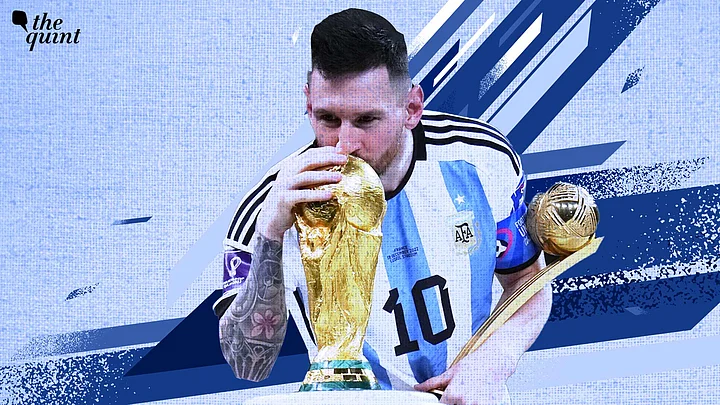As referee Szymon Marciniak blew the whistle to signal for a penalty shootout to decide the 2022 World Cup final between Argentina and France at the Lusail Stadium on Sunday, Lionel Messi walked silently towards the touchline.
It was difficult to gauge what was going through his mind. During the past 120 minutes or so, he must have gone through emotions of a lifetime. For Argentina had taken the lead twice after finding the back of the net thrice — with Messi scoring the first and third goals — before being dragged back to earthly hell from heavenly ecstasy by a certain Kylian Mbappe, who scored a hat-trick on the night.
Or Messi might not be just thinking about this match at all but about all the previous three occasions — 2015, 2016 and 2022 — where Argentina lost all the Copa America finals on penalties. Prior to these heartbreaks, there was the 2014 World Cup final too against Germany at the Maracana. That had also gone to the extra time only for Mario Gotze to shatter Messi’s dreams with a 111th minute strike.
So, would history repeat itself? Would football again deny Messi the biggest prize?
Not this time. This was a different Messi leading a different Argentina side, one full of self-belief and confidence. Otherwise, how would you explain Emiliano Martinez’s little shimmy after France youngster Aurelien Tchouameni shot his penalty wide or Gabriel Montiel keeping a cool head before burying the last penalty to give Argentina the much-cherished win? This team saw every opportunity as a chance to cement their place in history much like the way the old warhorse Angel di Maria did earlier in the match when he won a penalty and scored a terrific second goal for Argentina.
But this night was about Messi and how he kept chiselling at greatness before finally finding a seat in the same pantheon as Pele and his legendary predecessor Diego Maradona. The three masters had a different journey to the World Cup glory, each unique in its own way. But they were tied together by their sheer desire and will-power to win the biggest title, which is often regarded as the yardstick to measure greatness.
There has never been any doubt about Messi’s place among the greats but a large World Cup-sized hole would often throw the comparisons astray. On Sunday, there was finally a closure.
He can now add the World Cup to seven Ballons d’Or, one Copa America, four Champions Leagues, 10 La Liga titles with Barcelona and a Ligue 1 crown with Paris St-Germain and make a case for being the best ever to have played the game.
Messi’s coronation also probably ended the GOAT debate. The 2022 World Cup presented the final opportunity for the two defining figures of the era — Messi and Portugal’s Cristiano Ronaldo — to win a trophy regarded as essential for staking a claim to the best who ever played.
At 37, Ronaldo failed miserably. He remained in denial about his physical decline and contributed little to Portugal’s cause. A once-terrific player, Ronaldo looked a pale shadow of himself and even lost out on a place in the starting XI for Portugal’s knockout round matches.
Unlike Ronaldo, Messi was more pragmatic. In a bid to economise his movements, the 35-year-old ambled through games, saving himself for the big moments where he could make a difference. That’s how he could jumpstart Argentina’s World Cup campaign once again with a brilliant goal against Mexico after the Albicelestes suffered a seismic shock 2-1 defeat at the hands of Saudi Arabia in the first match.
On the ball, he depended largely on his trickery — flicks, feints and the swivel of his hips. That’s how he could humiliate the 20-year-old Croatian defender, Josko Gvardiol, almost 15 years his junior, when he twisted and turned before laying off the ball into a surging Julian Alvarez. Or the infamous no-look pass that tore apart the Dutch defense. This wisdom wasn’t just acquired overnight but through unmatched experiences of a storied career.
Messi also metamorphosed into the supreme leader where he felt responsible for his teammates. There were moments when an ‘aggressive’ Messi took the attack to the opposition through brutal fouls while he didn’t shy away from confronting referees over a controversial decision. However, it never seemed that he transcended his team. Rather, he was playing the guardian angel.
But how far was this angel being accepted by his own countrymen?
By playing abroad, Messi always seemed to be a bit caught in no man’s land — insecure about his connection to Argentina while being alienated from his adopted home. He was both a hero and a stranger to his countrymen, a condition that was further aggravated by the fact that he was yet to win the biggest trophy of them all for his country.
But the final chapter of Messi’s World Cup epic probably repaired that relationship with his compatriots too as hordes of Argentineans continued to sing Muchachos — the unofficial anthem of Argentina in this World Cup — well into the night, thereby completing a fairytale ending and leaving a lasting legacy of the man, the myth and the master.
